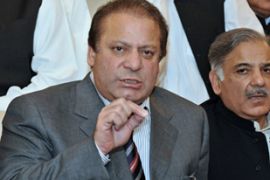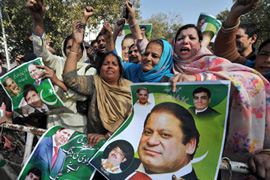Pakistan’s Sharif urges protests
Call comes in response to court ban on ex-PM and his brother from contesting elections.

The decision prevents Sharif from challenging Zardari in general elections in 2013 and also means that Shahbaz Sharif cannot continue as head of the provincial government in the country’s political heartland and most populous and wealthy region, Punjab.
Al Jazeera’s Imran Khan, reporting from Lahore, the main city of Punjab, said: “This is a microcosm of a deepening political crisis. What’s happening here in Lahore will have reverberations throughout Pakistan because the constitutional crisis is all due to one issue – the lawyer’s protest movement. It’s now a battle between the government and the opposition.”
Zardari blamed
Sharif, 59, and his supporters accused Zardari of exerting pressure on the court to issue the ruling to neutralise a political threat.
“Now the case has come to the court of the 160 million people of Pakistan,” Sharif said in a televised media conference.
“I think the nation will have to rise against such actions. I assure the nation [that] if they back us, we will establish a democratic set-up in this country.”
 |
| Sharif supporters are angry over a court order preventing him from holding office [AFP] |
Zardari did not immediately respond to the allegations.
The court decisions against the Sharif brothers triggered anti-government demonstrations in Lahore among other cities and a five per cent drop in the main stock market on fears of street violence.
“I don’t believe in violence and do not want any destruction, but if people want to express their feelings against this decision, who can stop them?” Sharif said.
The supreme court issued Wednesday’s ruling in response to appeals against a ruling barring Sharif from contesting elections because of a criminal conviction dating back to his overthrow in a coup by Musharraf, then Pakistan’s army chief, in 1999.
It was also considering allegations of irregularities in Shahbaz Sharif’s election to the Punjab state assembly.
The court’s ruling left Punjab in temporary control of the governor, a Zardari appointee. It was unclear when a new provincial government would be formed.
Biggest challenge
Sharif, 59, has re-emerged as an important player in Pakistani politics since he returned after seven years in exile in Saudi Arabia, and has been campaigning to reinstate constitutional court judges dismissed when Musharraf declared emergency rule in 2007.
Sharif’s conservative Pakistan Muslim League-N – the country’s second biggest party – refuses to recognise any judge appointed by Musharraf under the emergency.
Sharif had co-operated with Zardari to oust Musharraf, but their alliance quickly broke down once Zardari took office amid disagreements about whether the judges issue.
Sharif went into opposition.
Our correspondent said the court decision’s political fallout is turning out to be the biggest challenge that Zardari has faced so far.
“The problem is that Nawaz Sharif doesn’t accept the current supreme court and says it is illegal because it was sworn under the state of emergency that was brought about by General Musharraf,” he said.